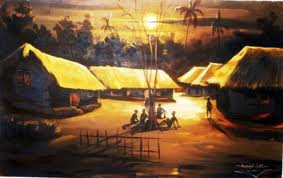Moonlight Stories: Preserving Tradition in Nigerian Culture


In the vast tapestry of Nigerian culture, moonlight stories hold a special place. For generations, these captivating narratives have been an integral part of traditional gatherings, weaving together folklore, wisdom, and entertainment like the moonlight that blankets the land come nightfall.
Originating from various ethnic groups across Nigeria, moonlight stories were traditionally shared outdoors, under the enchanting glow of the moon. The storytelling sessions served as a time for families and communities to come together, passing down tales that have shaped their cultural identity and understanding of the world.
These stories often revolve around mythical beings, legendary warriors, and everyday heroes and heroines who conquer challenges and embody noble virtues. They are rich with symbolism, teaching listeners valuable lessons about morality, responsibility, humility, and respect for elders. They serve as a medium for teaching cultural values, educating children about their heritage, and instilling a sense of pride in their roots.
One prominent example of a moonlight story in Nigerian tradition is the story of Anansi, the cunning spider. Originating from various West African countries, including Nigeria, Anansi stories have been used to teach both children and adults alike important life lessons. Anansi, despite his diminutive size, uses his wit, craftiness, and cleverness to outsmart powerful animals such as the lion, the leopard, and the elephant. These tales highlight the value of intelligence, quick thinking, and the ability to navigate complex situations.
Another well-known moonlight story in Nigerian tradition is the tale of Sango, the Yoruba god of thunder. Sango stories depict his intense power and depict him as a deity who punishes wrongdoing and rewards virtue. These stories emphasize the consequences of one’s actions, teaching that justice and morality are upheld even by the gods themselves.
In addition to cultural preservation, moonlight stories play a crucial role in fostering a sense of community. As households and communities come together to hear these tales, bonds are strengthened, and relationships deepened. The collective experience of listening to these stories under the serene moonlit sky creates a shared memory and sense of belonging that brings people closer together.
However, the advent of modernity, urbanization, and the influence of global media has posed challenges to the transmission of moonlight stories. With distractions like television, smartphones, and the internet, the younger generation’s interest in these stories is slowly waning. Despite this, efforts are being made to preserve and promote this valuable tradition.
Various organizations and individuals are working to collect, document, and publish these stories. With the aid of technology, audio and video recordings of moonlight storytelling sessions are being made, ensuring that future generations can access and appreciate this treasure trove of Nigerian folklore. Cultural festivals and events are being organized to celebrate moonlight stories, helping to create awareness and reignite interest in this traditional art form.
Parents, educators, and community leaders also have a crucial part to play in the preservation of moonlight stories. By incorporating these tales into school curricula, hosting storytelling evenings in communities, and encouraging children to explore their cultural heritage, the importance of moonlight stories can be perpetuated.
